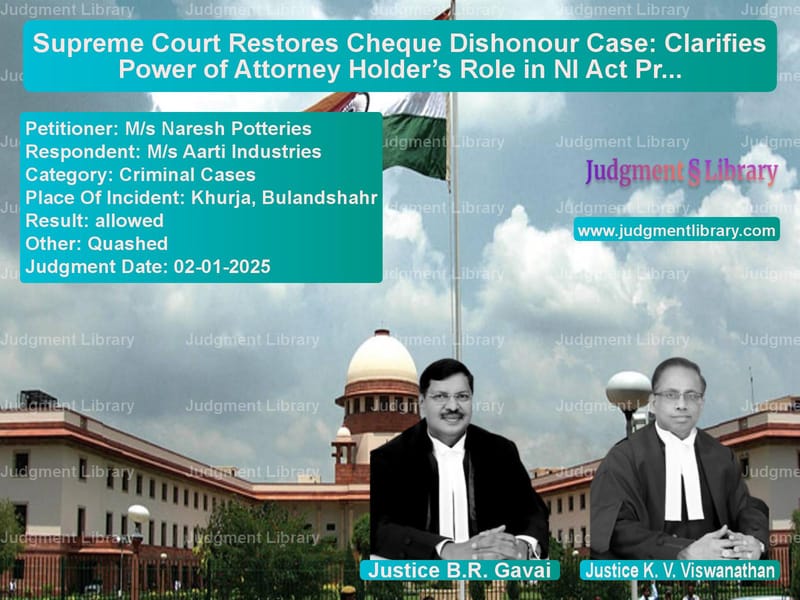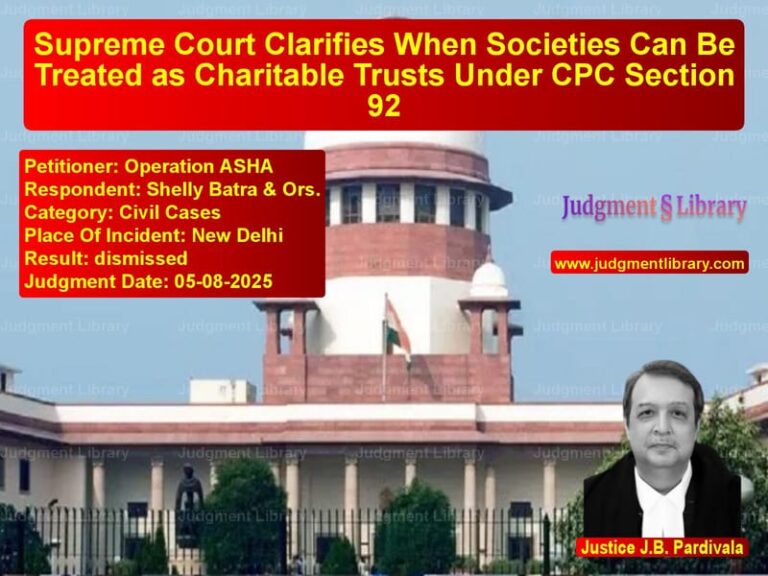Supreme Court Restores Cheque Dishonour Case: Clarifies Power of Attorney Holder’s Role in NI Act Proceedings
The Supreme Court of India recently delivered a crucial judgment in the case of M/s Naresh Potteries v. M/s Aarti Industries, shedding light on the role of power of attorney holders in cheque dishonour cases under Section 138 of the Negotiable Instruments Act, 1881 (NI Act). The ruling clarifies that a complaint filed by an authorized agent with knowledge of the transaction cannot be dismissed merely on technical grounds. The decision overturns an earlier ruling by the High Court, which had quashed the criminal proceedings on the grounds that the complainant’s representative lacked personal knowledge of the facts.
Background of the Case
The case revolves around a business transaction between M/s Naresh Potteries, the appellant, and M/s Aarti Industries, the respondent. The appellant, engaged in the manufacture and sale of crockeries, insulators, and hardware fittings, supplied goods worth Rs. 1,70,46,314 to the respondent. In return, the respondent issued a cheque dated July 10, 2021, which was dishonoured due to insufficient funds. Following the dishonour, the appellant initiated proceedings under Section 138 of the NI Act.
Subsequently, the respondent filed a counter-allegation claiming that the cheque was fraudulently issued. The High Court of Allahabad quashed the criminal proceedings, citing that the complaint was filed by a power of attorney holder without specific averments regarding his personal knowledge of the transaction.
Key Legal Issues
- Whether a complaint under Section 138 of the NI Act can be filed by a power of attorney holder.
- The requirement of personal knowledge for the complainant’s representative in cheque dishonour cases.
- The scope of the High Court’s power under Section 482 of the Cr.P.C. to quash criminal proceedings.
Arguments by the Petitioner (M/s Naresh Potteries)
- The petitioner argued that the High Court misinterpreted the law by dismissing the complaint solely based on technical grounds.
- The power of attorney holder, being the manager of the firm, had direct knowledge of the transactions and was competent to file the complaint.
- Reliance was placed on previous Supreme Court rulings, including Shankar Finance and Investments v. State of Andhra Pradesh and Vinita S. Rao v. Essen Corporate Services, which upheld the validity of complaints filed by authorized representatives.
- The law does not require the complainant to be the actual payee as long as they are authorized to act on behalf of the payee.
Arguments by the Respondent (M/s Aarti Industries)
- The respondent contended that the complaint was invalid since the power of attorney holder did not explicitly state his personal knowledge of the transaction.
- It was argued that since the complaint was filed by a representative, it lacked the statutory requirements prescribed under Section 142 of the NI Act.
- The High Court was justified in quashing the proceedings as there was no explicit averment in the complaint that the representative had direct involvement in the transaction.
Supreme Court’s Observations
- The court noted that the NI Act allows a company or a firm to file a complaint through an authorized representative.
- “The requirement of Section 142 of the NI Act that the payee should be the complainant is met if the complaint is in the name of the payee,” the court observed.
- “A company can be represented by an employee or a non-employee authorized by a resolution or power of attorney,” the bench stated.
- The court emphasized that procedural technicalities should not be used to defeat substantive justice, particularly in cheque dishonour cases.
- The court clarified that the complaint was filed in the name of M/s Naresh Potteries, fulfilling the statutory requirement, and the power of attorney holder was competent to depose on behalf of the complainant.
Judgment and Conclusion
The Supreme Court allowed the appeal, set aside the High Court’s order, and restored the criminal proceedings before the trial court. The judgment reinforces the principle that technical objections should not be used to derail legitimate claims under the NI Act. The decision provides clarity on the role of power of attorney holders in cheque dishonour cases and ensures that justice is not denied due to procedural irregularities.
The ruling serves as an important precedent for businesses dealing with financial transactions, affirming that authorized representatives with sufficient knowledge can validly initiate proceedings under the NI Act.
Petitioner Name: M/s Naresh Potteries.Respondent Name: M/s Aarti Industries.Judgment By: Justice B.R. Gavai, Justice K. V. Viswanathan.Place Of Incident: Khurja, Bulandshahr.Judgment Date: 02-01-2025.
Don’t miss out on the full details! Download the complete judgment in PDF format below and gain valuable insights instantly!
Download Judgment: ms-naresh-potteries-vs-ms-aarti-industries-supreme-court-of-india-judgment-dated-02-01-2025.pdf
Directly Download Judgment: Directly download this Judgment
See all petitions in Fraud and Forgery
See all petitions in Bail and Anticipatory Bail
See all petitions in Judgment by B R Gavai
See all petitions in Judgment by K.V. Viswanathan
See all petitions in allowed
See all petitions in Quashed
See all petitions in supreme court of India judgments January 2025
See all petitions in 2025 judgments
See all posts in Criminal Cases Category
See all allowed petitions in Criminal Cases Category
See all Dismissed petitions in Criminal Cases Category
See all partially allowed petitions in Criminal Cases Category







